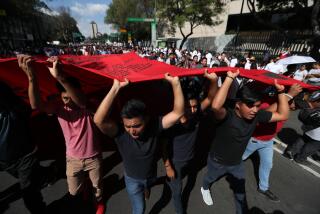Nicaragua Strike Eases; Talks Demanded : Labor strife: The Sandinista-led unions extend an olive branch. But they want negotiations now.
- Share via
MANAGUA, Nicaragua — Pro-Sandinista organizers told strikers Wednesday to ease their stranglehold on Managua but demanded that the government of President Violeta Barrios de Chamorro reopen talks within hours.
There was no specific answer from the 10-week-old government, although officials did indicate a willingness to negotiate a settlement.
There were signs of continued discord, meanwhile, in the fragile and fractious 14-party coalition that brought Chamorro to power.
A few of the barricades in the city came down. The gunfire that had crackled across the capital ended in the morning, but strikers still occupied most government ministries and some state-run industries.
At least four people have been killed and 84 injured in unrest that began after tens of thousands of government workers went on strike 11 days ago. Strike leaders say 90,000 workers have walked off their jobs.
The strikers say they want an end to what they call mass firings of public employees by the Chamorro government, and they also seek a voice in government economic policy. They won 100% pay rises in a strike in May.
Chamorro’s U.S.-backed government has declared the strikes illegal, saying they are inspired by political instead of economic issues. The government suspended talks over the weekend.
A statement issued by the Sandinista-run National Workers’ Front, which controls most of the striking unions, urged strikers “to create conditions favoring the start of talks, allowing the circulation of people and transport in areas where the Sandinista police demand it.”
“In agreement with what the constitutional government expressed, we urge the start of negotiations between the government and the FNT (the front) to find a solution to the demands presented by the workers,” it said.
The statement, read on pro-Sandinista Radio Ya, proposed that the negotiations begin at 1 p.m. PDT.
The statement did not say what strikers would do if talks are not held.
The presidents of Guatemala, El Salvador, Costa Rica and Honduras issued a vague joint declaration late Tuesday “calling on the international community to lend its valuable assistance to the Nicaraguan government in its search for a solution to the crisis it is undergoing.”
Information Secretary Danilo Lacayo said Chamorro thanked the Central American presidents who offered their support and told them she believes the problems should be resolved among Nicaraguans.
Guatemalan President Vinicio Cerezo Arevalo, who was visiting Honduras, said he thought Chamorro could handle the situation.
“We should not get nervous even though the situation is difficult in Nicaragua,” he said.
A government radio announcement expressed confidence that “the situation will solve itself with the same civic spirit the majority of the Nicaraguan people showed last Feb. 25” in the elections that brought Chamorro to power.
The developments Wednesday did not seem to make a major difference in daily life in Managua, although a few more people were in the streets.
Witnesses said government soldiers also were helping build barricades despite orders that they restore peace in the capital.
The capital continued without public transportation, and most grocery stores remained closed. The remaining barricades and trenches dug across some streets stopped most traffic.
Bombs and gunfire were heard overnight, but there were no immediate reports of casualties.
Air traffic controllers went back to work Wednesday and said the international airport is open, although no flights were arriving or departing.
More to Read
Sign up for Essential California
The most important California stories and recommendations in your inbox every morning.
You may occasionally receive promotional content from the Los Angeles Times.













